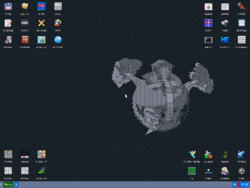Main Page: Difference between revisions
Jump to navigation
Jump to search
Asiekierka (talk | contribs) No edit summary |
(add about exfat support) |
||
| (26 intermediate revisions by 6 users not shown) | |||
| Line 6: | Line 6: | ||
caption = KolibriOS desktop| | caption = KolibriOS desktop| | ||
developer = [http://www.kolibrios.org/?p=ContactUs KolibriOS Project Team]| | developer = [http://www.kolibrios.org/?p=ContactUs KolibriOS Project Team]| | ||
working_state = Active | | working_state = Active | | ||
kernel_type = [http://en.wikipedia.org/wiki/Monolithic_kernel Monolithic kernel] | | kernel_type = [http://en.wikipedia.org/wiki/Monolithic_kernel Monolithic kernel] | | ||
license = [[GNU General Public License|GPL]] | | license = [[GNU General Public License|GPL]] | | ||
| Line 16: | Line 12: | ||
}} | }} | ||
KolibriOS is an [http://en.wikipedia.org/wiki/Open-source_software open source] [http://en.wikipedia.org/wiki/Operating_system operating system] for [http://en.wikipedia.org/wiki/x86_architecture x86] computers based on [http://en.wikipedia.org/wiki/MenuetOS MenuetOS], written entirely in [http://en.wikipedia.org/wiki/FASM Assembler/FASM]. | KolibriOS is an [http://en.wikipedia.org/wiki/Open-source_software open source] [http://en.wikipedia.org/wiki/Operating_system operating system] for 32-bit [http://en.wikipedia.org/wiki/x86_architecture x86] computers based on [http://en.wikipedia.org/wiki/MenuetOS MenuetOS], written entirely in [http://en.wikipedia.org/wiki/FASM Assembler/FASM]. | ||
'''IMPORTANT:''' Help KolibriOS development | '''IMPORTANT:''' Help KolibriOS development with you ideas and contribution! | ||
<center> | <center> | ||
| Line 26: | Line 22: | ||
|- | |- | ||
![http://board.kolibrios.org/ Forum] | ![http://board.kolibrios.org/ Forum] | ||
![[HowTo | ![[HowTo|Documentation]] | ||
|- | |- | ||
![http://builds.kolibrios.org/ Nightly Builds] | ![http://builds.kolibrios.org/ Nightly Builds] | ||
![[ | ![[Development|Development]] | ||
|- | |- | ||
![http://bugs.kolibrios.org/ Bug Tracker] | ![http://bugs.kolibrios.org/ Bug Tracker] | ||
![[ | ![[Kolibri_tomorrow|Wanted Features]] | ||
|- | |- | ||
![http://websvn.kolibrios.org/ Source Repository] | ![http://websvn.kolibrios.org/ Source Repository] | ||
| Line 40: | Line 36: | ||
![[Hardware_Support|Hardware Support]] | ![[Hardware_Support|Hardware Support]] | ||
|- | |- | ||
! | ! | ||
![[Special:Categories|All categories]] | ![[Special:Categories|All categories]] | ||
|} | |} | ||
| Line 46: | Line 42: | ||
== KolibriOS Features == | == KolibriOS Features == | ||
* | * A [http://en.wikipedia.org/wiki/Monolithic_kernel monolithic] [http://en.wikipedia.org/wiki/Preemption_(computing) preemptive] [http://en.wikipedia.org/wiki/Kernel_(computer_science) kernel] that is less than 100 kilobytes in size, complete with streams, parallel execution of system calls, a USB and [[New_stack|TCP/IP]] stack. | ||
* Speed: Thanks to being (carefully) written in Assembler, it's very fast. | |||
* Size: KolibriOS is very small - The kernel and most of the programs fit on a 1.44MB floppy disk! | |||
* | * Filesystem support: Read/write support for FAT16/32 (with long file names), ExFAT and ext2/3/4, read-only support for NTFS, XFS and CDFS(ISO9660). | ||
* | * Lightweight: Kolibri boots on any computer that has a Pentium (i586) compatible processor and at least eight megabytes of RAM. | ||
* Lightweight | * Hardware support: A lot of the popular sound, network and graphics cards are supported (see [[Hardware_Support|supported hardware list]]) | ||
* Comes with a development kit (code editor with [http://en.wikipedia.org/wiki/FASM FASM] macro-assembler integrated). | * Comes with a development kit (code editor with [http://en.wikipedia.org/wiki/FASM FASM] macro-assembler integrated). | ||
== Branches == | == Branches == | ||
* | * [[EmbeddedKOS|Kolibri-A]] - an [https://en.wikipedia.org/wiki/Exokernel exokernel] version of KolibriOS for hardware engineers and driver developers | ||
<!-- Categories --> | <!-- Categories --> | ||
Latest revision as of 20:54, 3 November 2023
| KolibriOS | |
Error creating thumbnail: Unable to save thumbnail to destination
| |
 KolibriOS desktop | |
| Website: | www.kolibrios.org |
| Developed by: | KolibriOS Project Team |
| License: | GPL |
| Kernel type: | Monolithic kernel |
| Working state: | Active |
KolibriOS is an open source operating system for 32-bit x86 computers based on MenuetOS, written entirely in Assembler/FASM.
IMPORTANT: Help KolibriOS development with you ideas and contribution!
| Home | FAQ |
|---|---|
| Forum | Documentation |
| Nightly Builds | Development |
| Bug Tracker | Wanted Features |
| Source Repository | Applications |
| File Repository | Hardware Support |
| All categories |
KolibriOS Features
- A monolithic preemptive kernel that is less than 100 kilobytes in size, complete with streams, parallel execution of system calls, a USB and TCP/IP stack.
- Speed: Thanks to being (carefully) written in Assembler, it's very fast.
- Size: KolibriOS is very small - The kernel and most of the programs fit on a 1.44MB floppy disk!
- Filesystem support: Read/write support for FAT16/32 (with long file names), ExFAT and ext2/3/4, read-only support for NTFS, XFS and CDFS(ISO9660).
- Lightweight: Kolibri boots on any computer that has a Pentium (i586) compatible processor and at least eight megabytes of RAM.
- Hardware support: A lot of the popular sound, network and graphics cards are supported (see supported hardware list)
- Comes with a development kit (code editor with FASM macro-assembler integrated).
Branches